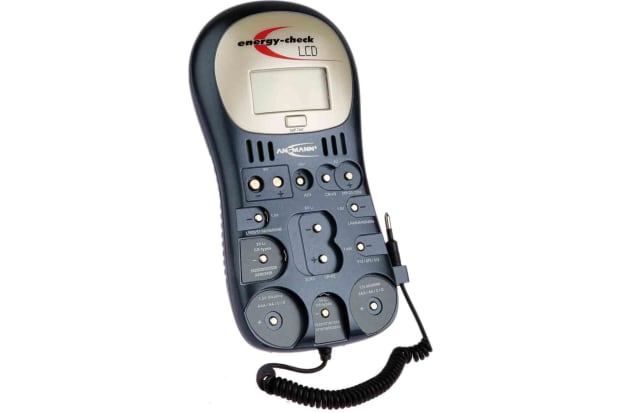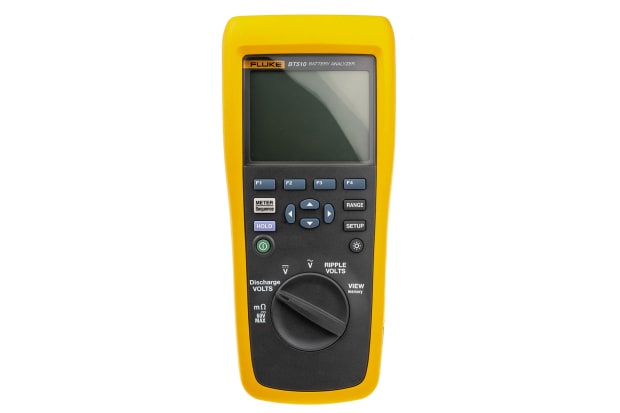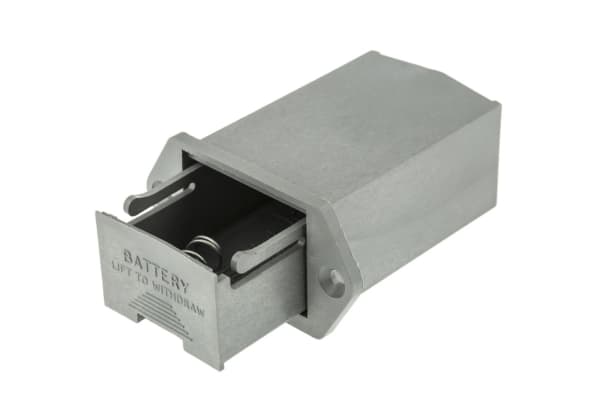- Published 11 Jan 2023
- Last Modified 29 Aug 2023
- 9 min
Battery Testers – A Complete Guide
Our guide will help you understand what battery testers are, the different types, their uses and how they work.

What is a Battery Tester?
Battery testers are electronic devices designed to test the remaining capacity of a battery’s overall charge. Contrary to popular belief, they do not test the voltage – simply the remaining capacity.
Every battery has a direct current. Battery testers work by applying a load and monitoring the voltage response of the battery. This enables the device to identify how much power is left in the battery.
Ideal for both monitoring and troubleshooting, battery testers are used across a broad spectrum of applications and industries, including:
- Industrial maintenance
- Automotive
- Facility maintenance
- Electrical
- Test and measurement
- DIY and domestic purposes
Simple and easy to use, these devices provide quick, straightforward results and are a staple battery charger accessory for professionals and DIY enthusiasts alike. Battery testers may also be known as voltage meters.
Types of Battery Tester
There are multiple different types of battery tester, each suited to varying battery types and sizes. Some of the most common types are detailed below.
Electronic Battery Tester
Electronic and digital battery testers are used to test the remaining capacity of a battery.
Most digital models feature an LCD display which presents the result of the battery test in a clear and easy to read format. Often displayed in the form of bars or a graph, depending on the particular model, this enables quick reading and analysis of the test results via a user-friendly interface.
Domestic Battery Tester
A domestic or household battery tester is normally used for rechargeable cylindrical batteries including AA batteries, AAA batteries, and 9V PP3 batteries.
Common battery chemistries include alkaline, NiCd, and Li-ion. These standard chemistry types cover the majority of everyday household batteries including those outlined above as well as additional battery types such as C batteries and D batteries. A typical domestic battery tester will be suitable for testing a combination of these battery types, if not all of them.
Universal Battery Tester
Universal battery testers are suitable for use with batteries in a range of different sizes. Similarly to domestic battery testers, they are primarily used for cylindrical batteries.
However, some voltage meters can test a large variety of different-sized batteries, ranging from smaller button cell batteries through to larger industrial and automotive batteries.
Car Battery Tester
Car battery testers are intended for use with lead-acid batteries. These testers connect to vehicle batteries to provide a clear indication of the battery’s health, condition, and voltage output.
Battery testers for automotive applications are important. It is crucial to determine the condition of car batteries as high currents are drawn during start-up. You must ensure that your tester is compatible with lead-acid batteries before use, in order to ensure safe testing conditions.
Battery Testers for Small Batteries

With smaller batteries, the voltage can stay fairly level over discharge of the battery. As a result, this means that it can be difficult to test a small battery with a standard digital multimeter. Instead, it is much easier to accurately check how much life is left in the battery using a purpose-designed tester for small batteries.
Depending on the particular model, battery testers for small batteries can typically be used with 12V batteries, AA batteries, alkaline batteries, and various other types. A digital AA battery tester will be ideal for domestic use, and these devices are usually also compatible with multiple different types of small battery.
How Does a Battery Tester Work?
Battery testers work by applying load and monitoring the voltage and current of the battery. The actual process is quite simple – when the conductive elements of the tester touch both the positive and negative contacts on the battery, the current is released and can be measured.
As battery testers solely measure current, they typically provide more accurate readings on certain types of batteries compared to others. For instance, the current in an alkaline battery will usually decrease at a steady rate, leading to more accurate results when tested. Conversely, Li-ion batteries, for example, experience greater drops at certain specified charge levels. This means that results are more likely to be inaccurate with these types of batteries due to their less precise charge levels.
How to Use Battery Testers

It is always recommended to refer to the instruction manual or manufacturer’s guidelines for your particular model. Additionally, before testing a battery, you must ensure that the tester is fully functioning and compatible with the type of battery you are intending to test.
The actual process of using a voltage meter is relatively simple and straightforward. You will need to insert the battery into the tester, ensuring the positive and negative contacts on both the battery and the tester match up correctly. Make sure that the battery is firmly secured in place before you take the reading.
As with any other tool or device, you should take care to protect and maintain your battery tester to help prolong its useable lifespan and minimise the risk of damage. Battery testers should be stored in cool, dry conditions such as within a toolbox. They are relatively low maintenance pieces of equipment and will usually require just a simple wipe down to keep the screen clean and free from dust and dirt. Remember, do not use a wet cloth as this could damage the device. Instead, use a clean cloth or ideally, specialised electronics cleaning wipes.
How to Take a Voltage Meter Reading
Once the battery is correctly positioned, you should be able to take a voltage meter reading.
Depending on the specific model you have, the output of the test may vary between several different results formats. If your battery tester displays a graph or chart, it should be easy to assess the battery’s remaining capacity.
As a general rule, batteries in the green or pointing towards the higher end of the scale are most likely to be in good working order with strong remaining capacity. Batteries with results around the middle of the scale may still be suitable for use in some lower-power applications, but close monitoring will be required. Batteries where the indicator points to the lower end of the scale, perhaps in the red section, will have little remaining capacity and should be changed or recharged, depending on the type of battery.
How to Choose the Best Battery Tester
Various factors will contribute towards the purchase of a battery tester. Most importantly, you must ensure that the tester you choose is compatible with the type or types of battery you will be testing. Additional features will largely come down to personal preference and your unique requirements.
Some key factors to keep in mind when looking for the best battery tester include the following:
- Compatible battery types
- Price and your budget
- Brand loyalty
- Additional features offered
As a result, deciding what is the best battery tester will primarily depend on your own requirements, so it is important to conduct thorough research and ensure the tester you choose meets your needs.
What is the Best Car Battery Tester?
Car battery testers must be dependable and reliable pieces of equipment. Ideal for a range of vehicles, these electronic devices enable car batteries to be tested or monitored quickly and easily.
RS Pro, our in-house range, offers high-quality battery testers for a range of battery types and sizes. RS Pro lead-acid car battery testers are the ideal solution, providing you with one of the best car battery testers at an affordable price. Click the button below to browse our full range of RS Pro car battery testers.
Popular Brands
****
Midtronics
Midtronics offers a wide range of industrial battery testers, suitable for a variety of battery sizes. Browse online with RS.
Ansmann
Whether you need a car battery, coin cell, or small battery tester, Ansmann is sure to have a tester to meet your requirements.
Fluke
Leading brand Fluke offers a range of high-quality battery testers and analysers, providing you with all the tools you need.
TecMate
Ideal for lithium or lead-acid batteries, browse all TecMate battery testers online and shop with RS.
FAQs
How Do I Test My Car Battery?
The easiest way to check a car battery is to use a dedicated automotive battery tester. Once again, you should always make sure to refer to the instruction manual of your chosen model before using the battery tester. More comprehensive instructions for particular models are usually supplied by the manufacturer, but the following guidelines should prove helpful:
- Attach the red lead to the positive charging terminal
- Attach the black lead to the negative terminal
- Check the battery tester’s screen for the results
What Voltage Should a Car Battery Be?
The voltage on a standard car battery is around 12.7 Volts. You may also read 13.8V on the battery when the car is running with the alternator float charging. Additionally, a boost charge would be 14.4 Volts. Therefore, a realistic Voltage reading on a lead acid battery would be between 11 and 13 Volts depending on the amount of charge left in the battery. 11V would indicate that the battery is moving into the region of needing a boost charge before battery sulphation occurs on the plates. You should bear in mind that this all relates to battery reconditioning.
Are Battery Testers Accurate?
While modern battery testers tend to have a good degree of accuracy, it is best to keep in mind that they are intended for indication only. Higher-quality testers will usually provide more accurate readings and may also offer additional features, depending on the model. Similarly, the accuracy of a battery tester will also be impacted by the type of battery being tested. For instance, testing an alkaline battery should provide a more accurate result than a test for a Li-ion battery, due to the different battery chemistry types.
Related Guides
Related links
- Battery Testers
- Ansmann 4000002 Car Battery Tester 12 V
- Ansmann 1900-0019 Car Battery Tester 12V Lead Acid
- TecMate TS126N Battery Tester For Various Battery
- TecMate TA20 Battery Tester 12 V
- SAM 913-30 Battery Tester 12 to 24 V
- BK Precision BK601B Battery Tester 12 V, 6 V
- Chauvin Arnoux P01191303 Battery Tester AA



